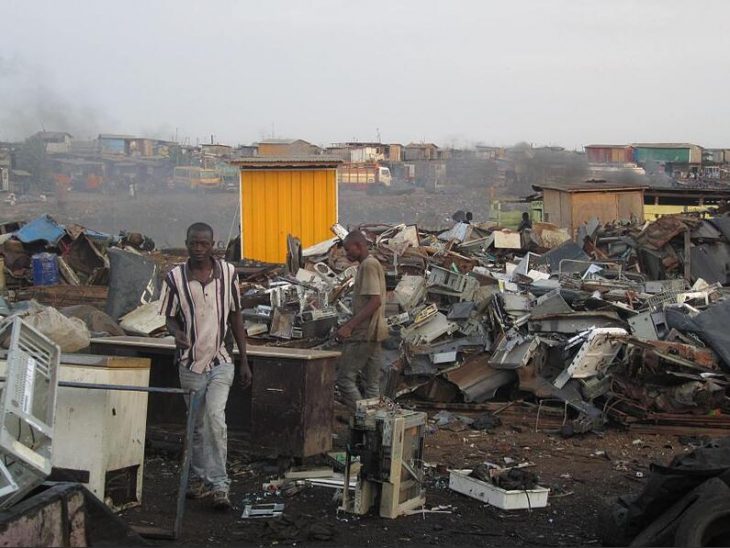The Galamsey dig for gold on their own account, which can be quite dangerous at times and has claimed many dozen victims in recent years. Formerly illegal and often viewed by mining companies as an annoying competition to their concessions, the Galamsey system has been officially recognized since 1989 with two restrictions: this form of gold mining is reserved for Ghanaians, concession areas are taboo. The number of these private gold miners is not known, but there are certainly several hundred thousand, including several Chinese who are in Ghana on a project basis and pursue this secondary activity, although it is illegal. In view of this extent, development relations with the Middle Kingdom have cooled down somewhat, and the Ghanaian population is now quite aloof from the Chinese. Official politics, however, which value Chinese know-how and investment capital, have tried to downplay the issue of illegal mining, and have so far been quite successful. But there are also Chinese companies that officially take part in the race for gold with heavy equipment, causing considerable damage and leaving behind “lunar landscapes”.
At the beginning of February 2016 there was a serious incident in Obuasi in which a senior employee of AngloGold was killed. The protest of angry, mostly illegal miners, who demanded extended access to a mine, got out of control. The manager tried to escape the mob with his car and had a fatal accident. A few days earlier, the military that was supposed to guard the temporarily closed mine had been withdrawn.
Just a few weeks later, in early March 2016, AngloGold announced that it had returned 60% of its shares in the company to the Ghanaian government. This means that more than 270 km² of the development area fell back to the state. The Obuasi gold mine, the Filetstück, remains in the possession of AngloGold.
Electronic scrap yard in Agbogbloshie
Electronic scrap yard in Agbogbloshie in Accra
As one of 16 countries located in Western Africa according to extrareference, Ghana has meanwhile become – alongside Nigeria – one of the most important storage locations for electronic waste from all over the world. The huge garbage dump in Agbogbloshie on the outskirts of Accra, where recycling and brisk trade also take place, is one of the largest. The completely non-transparent trade of these environmentally damaging goods in a globalizing world relieves the industrialized and emerging countries. But this rapidly growing and barely controlled area also offers illegal business people from all over the world a variety of opportunities to escape the relatively strict requirements in Europe. In countries like Ghana – as in the USA – there are no or at most lax regulations on the storage and recycling of electronic waste. The result is high profits, severe environmental damage and massive health risks for those who cavort in these junkyards. Nevertheless, the stench, smoke and the poisoning of the streams, lagoons, the groundwater and the air, caused by the flaring of cable sheaths, refrigerators, computer cases with their valuable secondary raw materials and rubber seals, do not prevent children and young people in particular from doing this hazardous work perform. Another business area has recently developed in Agbogbloshie: the massive disposal of old batteries. And on the edge of the garbage dumps, the traders are already waiting to buy the released metals and recyclable secondary raw materials from them for a few cedi. For the mostly minors there are few opportunities outside of this trade to earn a living, so that the influx of cheap labor does not slow down and the supply of electronic waste does not seem to dry up in the near future. Germany is an important country of origin for electronic waste and used batteries. This is the subject of the German government, which financially supports activities against this illegal import and the establishment of regulated recycling facilities.
But not only electronic waste is a huge environmental problem in Ghana. Normal waste also causes enormous damage to people and the environment. The beaches of the entire West African coast resemble a huge garbage dump, covering the sand, without the residents or the governments having given any serious thought to countering this environmental crime. If the sight of the polluted and littered beaches is an imposition for the few environmentally conscious, the problem worsens if you dig a little in the sand. Then after a few groundbreaking breaks, the full extent of the negligent garbage disposal and the rubbish washed up on the ground comes to light.
Sweaty work on the beach
Activists cleaning the beach in the Accra area
For some time now, environmental initiatives such as Plastic Punch or Environment360 have been involved to bring the enormous waste problem on the beaches of Ghana and the overarching topic of waste disposal closer to the local and international public with targeted actions. Regular collection campaigns at the weekends have already freed the beaches in the greater Accra area from tons of rubbish – mostly plastic bags for drinking water – and sent them to landfill or to recycling. Many GIZ employees now take part in the collection campaigns in their free time on weekends, which has considerably increased awareness in the local and social media and among the “expat community”. In the meantime, Plastic Punch has even managed to organize a “clean up” for the EU delegation. It is clear to everyone involved that this can only be the first step in tackling this major problem.



